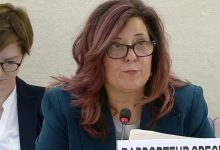Top UN Chief Urges Everyone to Take on Stigma Around Drugs with a People-Centric Approach
In his message to the opening of the 67th session of the Commission on Narcotic Drugs, Secretary-General António Guterres said the proliferation of powerful street drugs and pharmaceutical misuse needs to be addressed through balanced responses and collective action.
He called for countering drug trafficking, investing in drug use prevention, and ensuring equal access to health care and treatment, while protecting everyone’s rights and dignity.
“We must always strive to put people first by ending stigma and discrimination and strengthening prevention; stressing rehabilitation; upholding the human rights of people who use drugs; and expanding prevention and treatment programmes and health services,” he said.
“Together, let us unite around promoting the health and wellbeing of all people, advancing the Sustainable Development Goals (SDGs), and leaving no one behind,” he added.
Secretary-General António Guterres’ message to the Commission on Narcotic Drugs.
Commission on Narcotic Drugs
The Commission on Narcotic Drugs is the UN’s main policymaking body on drug control and drug policy. Established in 1946, it is responsible for monitoring the global drug situation, overseeing the implementation of international drug control treaties, and making recommendations on drug-related matters.
It consists of 53 member States elected by the New York-based Economic and Social Council for terms of three years.
Tweet URL
The 67th session of the Commission convenes against the backdrop of an increasingly complex landscape including drug trafficking networks, a record-high supply of certain illicit drugs and limited options for treatment for drug users, according to the UN Office on Drugs and Crime (UNODC).
Evolving challenges
“Drug challenges are evolving swiftly, as synthetics change the market, trafficking networks evolve their business model, and illicit markets overlap with conflict and instability,” said UNODC Executive Director Ghada Waly.
“The global response is at an important juncture, and the Commission on Narcotic Drugs must use this milestone session to unite around balanced responses that safeguard our communities, promote public health, and uphold human rights,” she added.
Ms. Waly also highlighted the urgent need for collective action in combating illicit drugs, calling for unity among nations to leverage international treaties and frameworks as well as greater political will and financial resources to confront the drug problem.
From pledges to action
At the session, which runs through 22 March, States will announce new pledges on addressing the drug scourge and turn policy commitments into action on the ground.
They are also expected to adopt key resolutions on topics related to rehabilitation and recovery management programmes, improving access and availability of controlled substances for medical and scientific purposes, and preventing and responding to drug overdoses.
Nora Chambers, an acclaimed journalist with a focus on global affairs and humanitarian issues, has dedicated over twenty years to reporting from conflict zones worldwide. Her work has spotlighted marginalized communities and highlighted urgent international concerns.




As a strong supporter of Secretary-General António Guterres’ call for a people-centered approach to combat drug stigma, I believe it is crucial to prioritize prevention and treatment programmes to ensure the health and dignity of all individuals. We must work together to end discrimination and uphold human rights for everyone, leaving no one behind in our efforts to address drug trafficking and misuse.
How can we effectively combat drug stigma while ensuring equal access to healthcare and treatment for all individuals?
To effectively combat drug stigma while ensuring equal access to healthcare and treatment for all individuals, it is crucial to prioritize education, destigmatization campaigns, and community support programs. By promoting empathy and understanding, we can create a more inclusive and supportive environment that encourages individuals to seek help without fear of judgment.
How can we ensure balanced responses and collective action to address the proliferation of powerful street drugs and pharmaceutical misuse, as highlighted by Secretary-General António Guterres?
To address the proliferation of powerful street drugs and pharmaceutical misuse, as highlighted by Secretary-General António Guterres, it is crucial for all stakeholders to work together in implementing comprehensive strategies. This includes enhancing coordination between law enforcement agencies, healthcare providers, and community organizations; investing in education and awareness campaigns to prevent substance abuse; and ensuring access to quality treatment and support services for those affected. By adopting a people-centric approach that prioritizes collaboration and compassion, we can make significant progress in combating drug-related challenges and promoting health and wellbeing for all.
As a mental health advocate, I completely agree with Secretary-General António Guterres’ call to end stigma and discrimination around drug use. Emphasizing prevention, rehabilitation, and access to healthcare is crucial in addressing drug-related issues. Let’s unite in promoting the health and wellbeing of all individuals and working towards achieving the Sustainable Development Goals.
As someone who has witnessed the devastating effects of drug abuse firsthand, I believe Secretary-General António Guterres’ call for a people-centric approach to addressing the stigma around drugs is crucial. We must all come together to prioritize prevention, treatment, and respect for the human rights of those affected. Only by working collectively towards these goals can we truly make a positive impact on the well-being of individuals and society as a whole.
As Emily Smith, I fully support Secretary-General António Guterres’ call for a people-centric approach to addressing drug-related issues. It is crucial that we prioritize ending stigma, promoting prevention and treatment programs, and upholding the human rights of individuals who use drugs. Together, we can work towards promoting health, well-being, and equality for all, and strive to leave no one behind. #TogetherWeCan
As a long-time advocate for drug policy reform, I applaud Secretary-General António Guterres’ call to address drug issues with a people-centric approach. It is crucial to prioritize ending stigma and discrimination, promoting prevention and treatment programs, and upholding the human rights of individuals who use drugs. Together, we must unite to ensure the health and well-being of all, in line with the Sustainable Development Goals.
How can we ensure that stigma around drugs is effectively addressed with a people-centric approach as suggested in the article?
To effectively address the stigma around drugs with a people-centric approach, it is crucial to prioritize education and awareness, promote empathy and understanding, and provide support systems for individuals struggling with substance use. By fostering a compassionate and inclusive environment, we can break down barriers and empower those affected to seek help and support. It’s about treating each person with dignity and respect, recognizing that everyone deserves access to resources and opportunities for recovery and well-being.
As a healthcare professional, I strongly believe that addressing the stigma around drugs is crucial for effective drug policies. We need to prioritize people’s well-being by focusing on prevention, treatment, and human rights protection. Secretary-General António Guterres’ call for collective action and equality in healthcare access is commendable. Let’s unite to promote a people-centric approach to drug issues and work towards achieving the Sustainable Development Goals.